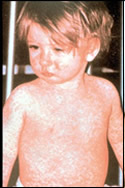Vaccines and Preventable Diseases:
Measles - Recommendations for Prevention
Children
The MMR vaccine is the safest protection you can give your child against measles. Children should be given the first dose of MMR vaccine soon after the first birthday (12 to 15 months of age). The second dose is recommended before the start of the kindergarten.

- Childhood Immunization Recommendations (0-6 years old)
- Adolescent Immunization Recommendations (7-18 years old)
- Contraindications
People who should not be vaccinated
Teens
Students entering middle school, high school, or college should have their vaccination records reviewed to make sure they have received both doses of the MMR vaccine.
Outbreaks continue to occur in high schools (one or two per year) and on college campuses (less than one per year). These educational institutions are potential high-risk areas for measles transmission because of large concentrations of susceptible people. That is why the CDC recommends that all states require proof of either two doses of the measles vaccine or evidence of past measles infection at the time of college or other post-high school entry.
Note: Pregnant women should not receive the MMR vaccine. Also, pregnancy should be avoided for 28 days following receipt of the measles vaccine or the MMR vaccine. updated July 23, 2008
- Adolescent Immunization Recommendations
(7-18 years old) - Contraindications
People who should not be vaccinated - Measles Vaccine and Pregnancy
- Vaccine Information Statement
Adults
Adults born after 1957 should receive at least one dose of measles vaccine unless they have already had measles and are immune. (This vaccine can also be given as measles mumps rubella (MMR) vaccine or measles rubella (MR) vaccine.) Those at increased risk of getting measles — college students, international travelers and healthcare workers — should receive two doses, provided they are given no less than 1 month apart.
Note: Pregnant women should not receive the MMR vaccine. Women should not become pregnant for 28 days following the receipt of the MMR vaccine or any of its components.
- Adult Immunization Recommendations
- Contraindications
People who should not be vaccinated - Measles Vaccine and Pregnancy
- Vaccine Information Statement
Travelers
People traveling outside of the United States are at increased risk of exposure to measles and should have evidence of measles immunity. This disease is quite common in many countries throughout the world. The CDC recommends that travelers who are not immune to measles receive two doses of the MMR vaccine for their own protection and to prevent importation of the measles virus into the U.S.
- CDC Travelers’ Health
- CDC Travel Advisory on Measles
- World Health Organization (WHO) report on measles (exit)
Return to main Measles Vaccination page
Non-CDC Link Disclaimer: Links to non-Federal organizations found at this site are provided solely as a service to our users. These links do not constitute an endorsement of these organizations or their programs by CDC or the Federal Government, and none should be inferred. The CDC is not responsible for the content of the individual organization web pages found at these links.
Content last reviewed on July 28, 2006
Content Source: National Center for Immunization and Respiratory Diseases
